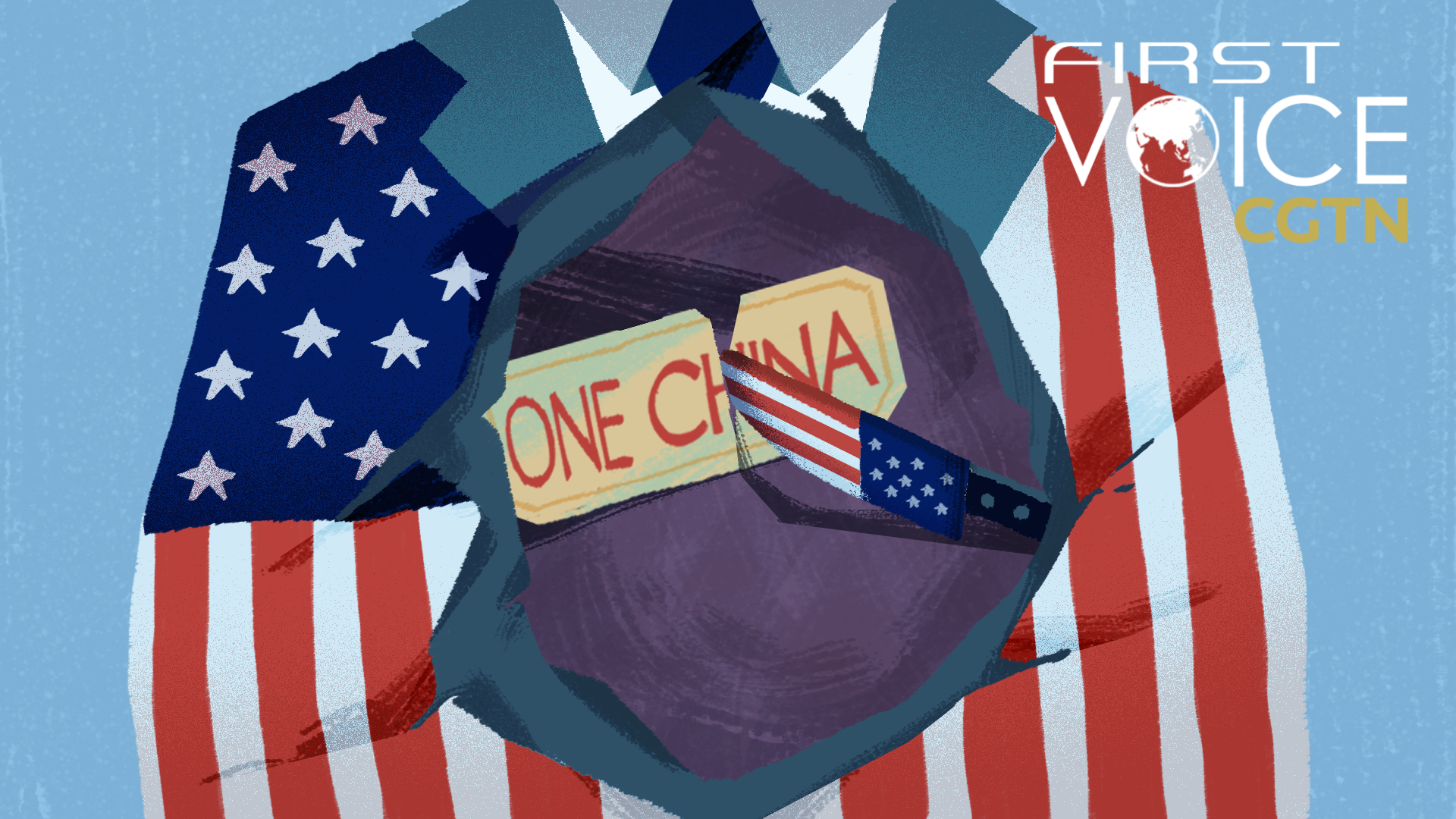
Biden's embracing of the "two-China" erodes the foundation of China-U.S. relationship and put the delicate relationship on even shakier grounds. /CGTN
Biden's embracing of the "two-China" erodes the foundation of China-U.S. relationship and put the delicate relationship on even shakier grounds. /CGTN
Editor's note: CGTN's First Voice provides instant commentary on breaking stories. The daily column clarifies emerging issues and better defines the news agenda, offering a Chinese perspective on the latest global events.
"U.S. forces, U.S. men and women would defend Taiwan in the event of a Chinese invasion?" Asked 60 Minutes correspondent Scott Pelley.
"Yes." U.S. President Joe Biden responded.
That one-word response says it all. As usual, the White House released a scripted statement after the interview saying that U.S. policy on Taiwan hasn't changed. The force and weight carried by the statement is as pale as it is hypocritical.
With the Senate advancing the Taiwan Policy Act of 2022, the timing of Biden's statement is a clear declaration of the establishment of U.S.'s "two-China policy" – one that's treating China's Taiwan region as a de facto independent state, advancing the relationship to a level that is as comprehensive as any official diplomatic relations (without officially naming it) and placing Taiwan under America's security umbrella with one very specific "enemy" in mind.
No other statement matters anymore: The White House official saying U.S. policy on Taiwan hasn't changed doesn't matter anymore; "Strategic ambiguity" doesn't matter anymore; U.S. saying it doesn't support "Taiwan independence" doesn't matter anymore; The foundation that sustained China-U.S. relations for nearly five decades doesn't matter anymore.
The aggressive and violent abandonment of the one-China policy and turning towards a "two-China policy" is no doubt a direct product of anti-China sentiments in the United States in recent years. One of the rare continuities in American politics these days is the recognition of China as a threat to its long-term security and position in the global order. The tone in the Biden administration was set by U.S. Defense Secretary Lloyd Austin when he described China as a "pacing challenge." And two months ago, the U.S.-dominated military organization NATO declared China a "systematic challenge."

A U.S. government plane carrying Speaker of the House Nancy Pelosi (D-CA) and her delegation arrives at Songshan Airport, in Taipei, Taiwan, China, August 2, 2022. /CFP
A U.S. government plane carrying Speaker of the House Nancy Pelosi (D-CA) and her delegation arrives at Songshan Airport, in Taipei, Taiwan, China, August 2, 2022. /CFP
But it is all the more startling and dangerous coming from a politician who once opposed the very statement he just made. In 2001, then Senator Joe Biden wrote in an op-ed for the Washington Post, calling then President George H. Bush's proclaimed commitment to defend Taiwan from attacks by the Chinese mainland as having "damaged U.S. credibility with our allies and sown confusion throughout the Pacific Rim." Senator Biden made the case by arguing that Washington has not been obligated to defend Taiwan since abrogating the 1954 Mutual Defense Treaty. And he made clear in a separate incident in response to then Taiwan leader Chen Shui-bian's push for independence that the U.S. is "not willing to go to war over your unilateral declaration of independence."
Now, President Biden had parroted Bush's statement several times while not tacitly supporting Taiwan's independence by saying, "Taiwan makes their own judgements about their independence." Just when did "not willing to go to war" become "committing U.S. forces to defend Taiwan in case of attacks by the Chinese mainland?" What if Tsai Ing-wen and the DPP decided to push for a vote and declare Taiwan independence, would Biden's commitment still stand? If the political leadership in Taiwan forced the Chinese mainland into military operations, will Biden change his mind yet again?
This is not a conjured-up mind-game, but a hypothetical scenario with a rapidly increasing possibility of becoming a reality. Speaker of the House Nancy Pelosi's visit has already emboldened the "Taiwan independent" forces on the island. Tsai and the DPP stand well-aware that U.S. politicians need to use Taiwan to look tough on China and they have been milking every ounce of the political benefits they could to strengthen their independence position. And nothing provides the separatist with more energy than witnessing the United States hollowing out the one-China policy and starting to treat Taiwan as an independent nation.
Like Biden said in his criticism of Bush, words matter. As the President of the United States, Biden's words represent official U.S. policies. His embracing of the "two-China" erodes the foundation of China-U.S. relationship and put the delicate relationship on even shakier grounds. China has made it very clear that there is only one China. The U.S. has made the worst decision by challenging this notion.
(If you want to contribute and have specific expertise, please contact us at opinions@cgtn.com. Follow @thouse_opinions on Twitter to discover the latest commentaries in the CGTN Opinion Section.)

